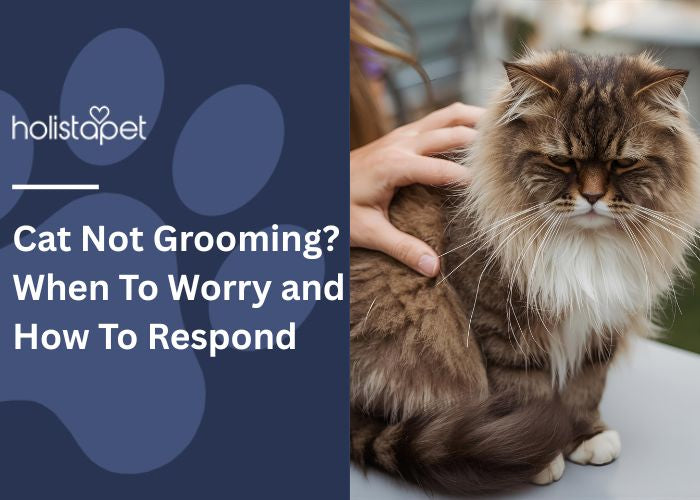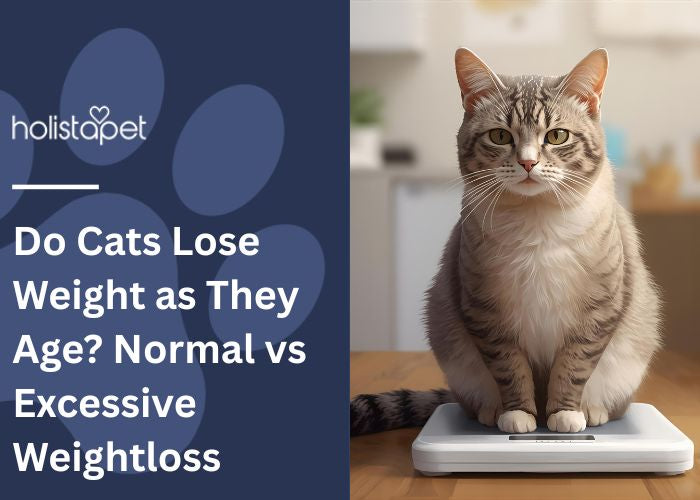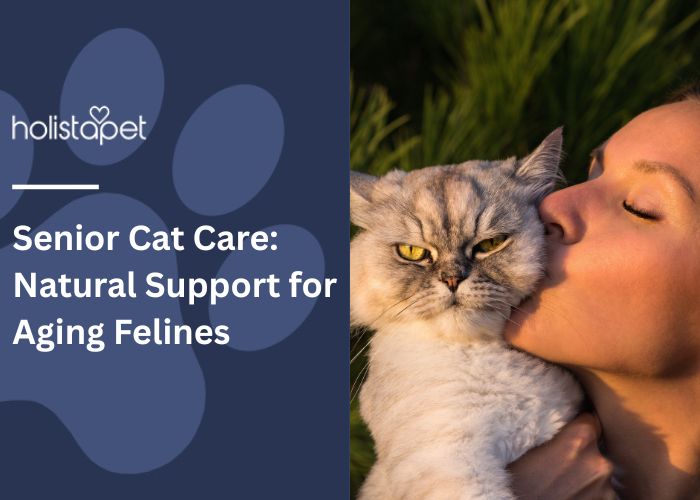If you've noticed your cat not grooming lately, that's a sign something's off. Felines take pride in their cleanliness, so a sudden change means they might need help. Maybe your kitty feels sore, anxious, or just plain tired.
Your cat's grooming routine keeps their fur soft, skin smooth, and mood steady. When they stop, it's worth paying attention. Let's find out what could be going on before the mats and mess get worse.
Why Cats Groom Themselves

Cats groom because it feels good and keeps them looking sharp. A healthy feline spends hours every day cleaning up, keeping their fur neat and their body comfortable. Grooming spreads a cat's natural skin oils, removes dirt, smoothens hair, and cools down the body. It's how they stay clean, confident, and calm. So when a cat stops grooming altogether, something's definitely wrong.
Signs Your Cat Isn't Grooming Normally
A cat who suddenly skips their self-care sessions is waving a furry red flag. Keep an eye out for the signs below, as they'll tell you a lot about what's happening:
-
Matted or Greasy Fur. A rough or sticky coat means your cat hasn't been spreading their natural skin oils.
-
Unpleasant Odor or Dirty Coat. Dirt and odor build up fast when grooming stops.
-
Dandruff, Hair Loss, or Skin Changes. These can hint at irritation or skin conditions.
-
Behavioral Clues. Lethargy, irritability, or withdrawal often point to discomfort.
Most Common Reasons Why Cats Stop Grooming
Cats may skip grooming for several reasons, and most of them tie back to how they feel physically or emotionally. Here are some possible explanations:
-
Pain and Physical Discomfort. Even mild unease can make stretching or licking unpleasant.
-
Arthritis and Joint Stiffness. Elderly cats often avoid bending because their joints ache.
-
Dental Problems or Oral Pain. Sore gums or teeth make licking painful.
-
Obesity and Limited Mobility. Too much weight keeps them from reaching certain areas.
-
Illnesses Like Hyperthyroidism or Kidney Disease. Both can affect energy and grooming.
-
Stress, Anxiety, and Depression. Emotional tension can dull motivation.
-
Aging and Cognitive Decline. Senior cats may simply forget or lose interest.
-
Recent Environmental or Routine Changes. A new pet, food, or schedule can throw them off.
Emotional Factors Behind Grooming Changes

Cats feel distress just like people do, and it often shows in their grooming. When tension builds, some kitties over-groom until bald spots appear, while others stop cleaning altogether. Loud noises, new pets, or sudden routine changes can make even calm felines anxious.
You can help by creating a peaceful space. Keep noise low, add cozy hiding spots, and spend a few minutes each day giving attention. Calmer surroundings help your feline friend feel secure, and soon their grooming habits may return to normal.
Health Conditions To Rule Out
Sometimes, a cat who doesn't groom has a medical reason behind it. A visit to the veterinarian can help find what's going on beneath the surface. Conditions like dental disease, arthritis, thyroid issues, or skin infections can all cause soreness that makes grooming painful or tiring.
Your vet may check for skin issues, ear infections, or internal problems through exams or tests. Getting a proper diagnosis early prevents bigger troubles later. Once the underlying issue is properly treated, affected cats often feel better and their grooming ability usually returns fast.
How To Help Your Cat Start Grooming Again
Helping your cat get back to grooming takes patience and gentle care. Try out these simple changes:
-
Regular Brushing and Coat Care. Brush your cat daily to remove tangles, dirt, and loose hair.
-
Maintaining a Clean and Calm Environment. Keep their space tidy and peaceful, so they feel safe.
-
Encouraging Gentle Activity. Play a bit each day to improve flexibility and mood.
-
Supporting Mobility and Comfort During Old Age. As cat's age, they need softer bedding and ramps for easy access to their favorite spots.
-
Using Soft Grooming Tools for Sensitive Skin Choose gentle brushes that don't irritate tender areas.
Natural Support for Stress and Discomfort
Natural support options can help ease tension and calm the mind without harsh ingredients. A balanced diet, plenty of fresh water, and quiet spaces all help your cat unwind. Herbal supplements and gentle remedies may also promote comfort.
CBD (cannabidiol) has become a popular choice among pet owners looking to reduce distress and support joint health. It interacts with your cat's body to encourage balance, helping them rest easier and return to their regular grooming routine.
How CBD May Help With Cat Grooming Issues
CBD may help cats who halt grooming by easing soreness and calming anxious feelings. It works with your cat's endocannabinoid system, a network that helps keep balance in mood, movement, and comfort. When that system runs smoothly, felines feel more relaxed and ready to return to their normal habits.
Many pet parents use CBD to support cats dealing with stressors, stiffness, or skin irritation. It may reduce tension, ease mild swelling, and help older cats move more freely. A calmer, more comfortable kitty is far more likely to start grooming again.
HolistaPet Products That Can Help

HolistaPet offers trusted, vet-approved wellness products designed with your cat's comfort in mind. Every formula uses natural, non-GMO ingredients that are vegan-friendly, gluten-free, and third-party lab tested for safety and quality. These products make it easy to support your pet's calmness, mobility, and grooming habits:
-
CBD Oil for Cats – Calm and Comfort in a Drop. Broad-spectrum CBD and other cannabinoids in a convenient dropper bottle. You can give it directly, or mix it with food or water.
-
CBD Cat Treats – Tasty Relief for Stressed Cats. Crunchy salmon or chicken treats with 2mg of CBD each. Grain-free, gluten-free, and made with all-natural ingredients for easy daily relief.
-
Calming Soft Chews – Soothe Anxiety and Encourage Self-Care. Soft salmon chews with 2mg of broad-spectrum CBD per treat. Ideal for nervous or older cats who need gentle calm and balance.
Tips for Preventing Future Grooming Problems
Regular care and attention can help you catch changes in your cat early before they become big problems. Try the following approaches:
-
Keep a Consistent Routine. Feed, play, and rest around the same time each day to reduce stressors.
-
Monitor Coat Health Weekly. Run your fingers through their hair to spot mats, dandruff, or rough patches.
-
Provide Mental and Physical Stimulation. Toys, scratching posts, and gentle play keep cats active and alert.
-
Schedule Regular Vet Checkups. Routine exams and expert advice help rule out illness and keep your cat feeling their best.
When To See a Veterinarian Immediately

If your cat suddenly stops grooming, it's time to call the vet. Rapid coat changes, skin lesions, or bald spots can signal something serious. Weight loss, fatigue, or unusual behavior also deserve quick attention. Felines hide pain well, so even small shifts can mean a bigger issue underneath.
Your veterinarian may perform bloodwork, dental exams, or skin tests to find the cause. Once they pinpoint the problem, they can guide you through treatment. Acting early gives your kitty relief faster and helps them get back to looking and feeling like themselves.
FAQs About Cats That Stop Grooming
Below, we'll look at common concerns like sudden grooming changes, stress-related behavior, bathing tips, and how CBD may support your kitty's comfort. These quick answers cover what you need to know about why cats stop grooming and how to help them get back on track.
Why did my cat suddenly stop grooming?
Cats usually stop grooming because something's bothering them physically, emotionally, or both. Soreness from arthritis, dental issues, or skin irritation can make cleaning uncomfortable. Stress, illness, or sudden changes in their environment can also cause them to lose interest in grooming.
If your cat's hair looks dull or greasy, or if they seem withdrawn, it's time for a checkup. A vet can determine the underlying cause and suggest ways to help. Once your pet feels better, that self-care instinct usually kicks right back in.
Can stress really make a cat stop grooming?
Yes, stress can absolutely cause a cat to stop grooming. Cats are creatures of habit, and emotional changes throw them off balance fast. New pets, loud noises, or even moving furniture can raise their anxiety levels, which often leads to poor grooming.
A distressed kitty might hide, skip meals, or lick one area too much. Calm their nerves with soft lighting, quiet corners, and gentle affection. Once they feel safe again, most cats slowly return to their normal grooming routine.
Will my cat start grooming again on their own?
Many cats return to grooming once the cause of their unease is gone. When soreness eases, energy returns, or anxiety fades, that familiar cleaning routine often resumes naturally. Some kitties may need a little extra encouragement with brushing or gentle wipes to get started again.
Keep a steady schedule and show patience. Offer a calm space, nutritious food, and plenty of affection. If grooming doesn't improve after a few weeks, your vet can review the situation and check for hidden problems.
Should I bathe my cat if they're not grooming?
You can bathe your cat if they’ve stopped grooming, but only when it;s truly needed. Bathing too often can dry out their skin and strip away natural oils. Use warm water, a mild cat-safe shampoo, and keep the process short to reduce distress.
If your cat resists or becomes anxious, try using grooming wipes or a damp cloth instead. Focus on messy spots like their back or tail. Regular brushing afterward helps maintain their coat between baths and keeps their skin healthy.
How can CBD help my cat feel better?
CBD can help your cat feel better by promoting calm and easing everyday soreness or unease. It supports balance in the body, which helps reduce tension. For cats who struggle with anxiety or stiffness, CBD may bring noticeable relief without making them drowsy or sluggish.
Regular intake can help feline pets relax, rest more comfortably, and regain their usual grooming habits. Many owners notice their cats seem more at ease and social once CBD becomes part of their wellness routine. Always check with your vet before starting any new supplement.
Final Thoughts: Helping Your Cat Feel Like Themselves Again
A cat not grooming is a sign they need a little extra care. With patience, vet guidance, and a calm home, most felines bounce back beautifully. The goal is simple: comfort, confidence, and that silky fur shine again.
HolistaPet makes that process easier with natural, vet-approved products crafted for cats' well-being. From CBD Oil to calming treats, every formula supports balance and relaxation. With the right care and a bit of love, your kitty can get back to feeling purr-fectly like themselves.


 CBD Oil for Cats - Fast Acting
CBD Oil for Cats - Fast Acting
 CBD Cat Treats - Easy Dose
CBD Cat Treats - Easy Dose
 CBD Calming Chews for Cats - Highly Rated
CBD Calming Chews for Cats - Highly Rated
 CBG Oil for Dogs and Cats - Loved by Thousands
CBG Oil for Dogs and Cats - Loved by Thousands





Leave a comment
All comments are moderated before being published.
This site is protected by hCaptcha and the hCaptcha Privacy Policy and Terms of Service apply.